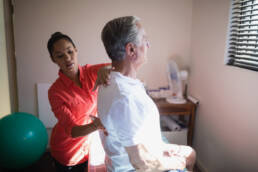Have you ever felt your back aching while you were sitting on the couch watching TV or when you were hunched over in your office chair? Or maybe you’re more likely to be in pain after spending a day cleaning and working around your house? If you are nodding your head in agreement with any of these, poor posture could be causing your discomfort. These normal daily activities put a lot of stress on your spine, and the resulting pain can stop you in your tracks. How exactly does poor posture cause lower back pain? Let’s take a closer look.
Poor Posture Puts Excess Strain on the Spine

The human spine has natural curves that create an ideal posture. Between the shoulder blades, the mid-back has a natural outward curve while the neck and lower back have inward curves. When we stand or sit with poor posture, the spine’s natural curves are subjected to excess strain.
When sitting in a slumped position in front of a television or computer screen, the discs in the lower back are subjected to 100 percent more pressure than they experience when we sit in an upright posture that maintains the lower back’s natural inward curve. Standing in a slumped position creates 125 percent more pressure in the lower back. And if you stand and lift a heavy object while you are in a slumped posture, your lower back has to ensure 250 percent more pressure.
Improving Your Posture
Fortunately, there are several things you can do to improve your posture and decrease lower back pain. When sitting down, ensure that your shoulders are lined up with your hips. Your lower back should have a slight inward curve. If you have trouble maintaining this curve, try rolling up a small towel and placing it behind your lower back.
When standing, keep your shoulders in line with your hips. Keep your hips in line with your knees and ankles. Avoid slouching or leaning forward to maintain the inward curve in your lower back pain.
Physical Therapy for Lower Back Pain Caused by Poor Posture
If you suffer from chronic lower back pain as the result of poor posture, physical therapy may help. At Denver Physical Medicine & Rehab, we offer posture correction services in Denver to help patients whose lives are impacted by poor posture. When you’re ready to learn more or schedule a complimentary consultation, please call 303-625-7834.
Ready for an expert opinion? Get in touch today!
Discover how physical therapy can help manage scoliosis in mild to moderate cases, along with other ways it offers healthcare solutions. Learn more from Dr. Mansi Dua, DPT, C2 Schroth Certified.





